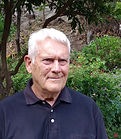A Lost connection
- Robert Stott
- Apr 8
- 3 min read

A Lost Connection: True Story.
In 1969, I had travelled overland from London and was staying in a shabby hotel in Calcutta. I learnt that Burma was closed to travellers, so I had to avoid it and book a flight to Bangkok in Thailand. The problem was that I didn’t have the money.
I telegrammed my mother in Melbourne to send some money. No answer. I telegrammed again. No answer. I had a lost connection. The hotel manager pestered me for payment. Finally, after eight days. I managed to get through and received a postal order with the desperately required money.
I flew to Bangkok and hitch-hiked to Singapore. More trouble, the border officers wouldn’t let me into Singapore. I was a decadent Western hippy; my hair was too long. I borrowed scissors, clipped my hair about the ears, slicked the rest back with water, and re-presented myself. This time, I was let in.
Fortunately, a cargo vessel was leaving for Jakarta. I hopped on it with several other locals and backpackers. Our accommodation was on the deck, and we were fed fish heads and rice. The fish heads saw us through the night. In Jakarta, I teamed up with a New Zealander and a Canadian. We caught a train across Java to Bali. Our companions on the train were a bunch of fit, muscular soldiers. We didn’t talk to them; we just eyed each other. Relations between Australia and Indonesia were not close.
From Bali, I flew to Kupang, the capital of West Timor. The journey then was on the back of an open truck, along deeply rutted bush tracks and over riverbeds, to the border with East Timor, as it was then known. The New Zealander was rude to the police at the station near the border. They threatened to lock him up and would not let him continue. Eventually, he paid a fine. The police then pointed to a dusty track heading east, and off we went, the three of us with our backpacks. It was about twenty kilometres. There was no official border, just a no man’s land of trees and scrub. We climbed a hill and eventually arrived at Balibo, a small village with a Chinese grocery shop. We camped in the shop's concrete foyer and waited. I don’t know what we waited for, but we just hoped something would eventuate. Balibo was where five journalists, including three Australians, were shot dead when the Indonesian army attacked a few years later.
The next day, a Portuguese policeman arrived from somewhere in his jeep. He must have been alerted about us. He was friendly and ready to help. He made phone calls and advised that there was an army landing craft down on the coast. He took us down through the jungle in his jeep to the landing craft. We spent the night sitting in the cargo area and arrived the following day at Dili, the capital of East Timor. From there, we got a flight to Darwin in an old World War 2 DC3 with iron seats strung with canvas,
I was on my own after that. But luckily, I met two young blokes who had travelled to Darwin in a FB Holden. They gave me a lift to Adelaide and, from there, caught a bus to Melbourne. The journey was over.
Of all the incidents on the trip, the scariest and most stressful was in Calcutta, trying to get money to continue travelling. All I had was a lost connection.


Comments